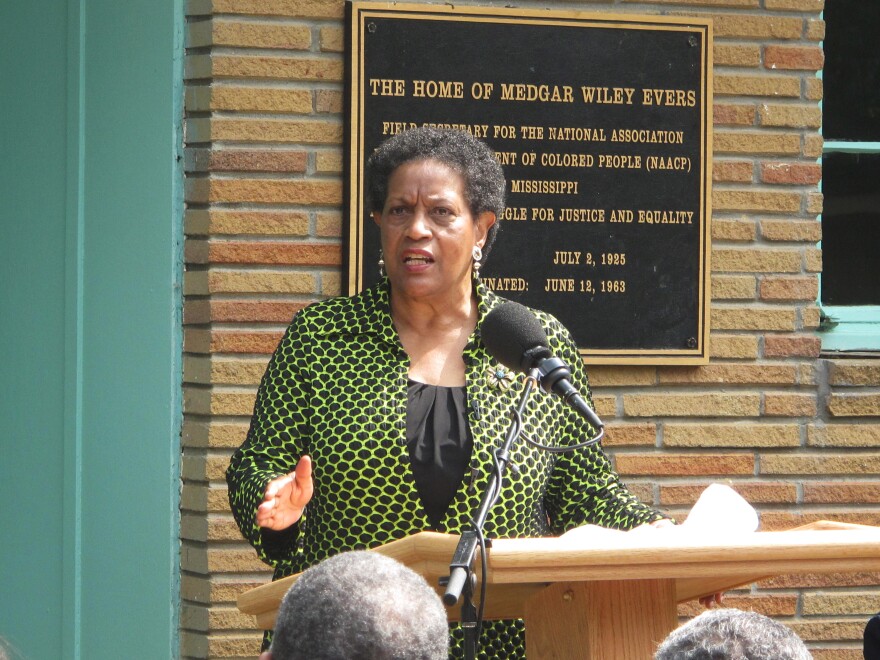For Myrlie Evers-Williams, the widow of slain NAACP leader Medgar Evers, the memories of 1963 are still raw.
Her family lived in terror behind the locked doors of their Jackson, Miss., home — a modest, three-bedroom, ranch-style house in one of the first new subdivisions built for African-Americans in Mississippi's segregated capital city. A back window in the tiny kitchen frames the backyard where Evers-Williams once grew rose bushes and a plum tree.
The family moved to Jackson when Evers accepted a job as the NAACP's first field secretary in the South — a job that made him a target of the white supremacists who would stop at nothing to preserve Jim Crow.
"Medgar became No. 1 on the Mississippi 'to kill' list," Evers-Williams says. "And we never knew from one day to the next what would happen. I lived in fear of losing him. He lived being constantly aware that he could be killed at any time."
The house was firebombed. The kitchen phone rang constantly with threats. Scars from the attacks still remain today.
Finally, just after midnight on June 12, 1963, a bullet struck Medgar Evers as he pulled into the driveway. Inside the house, the Evers' three young children heard the gunfire.

Reena Evers-Everette, just 8 years old at the time, says they immediately acted out the emergency drill their family had practiced time and time again: dropping to the floor alongside her brother Darrel, pulling down their younger brother, Van, and going into the tub in the bathroom.
"And then," she says, "we stopped and ran down the steps and begged our father to get up."
They found him on the carport, in a pool of blood, shot in the back.
The murder made the national news. It was yet another report of the brutal response to civil rights activists in the South. Just a month before, police in Birmingham had turned fire hoses and police dogs on young protesters.
The violence in 1963 grabbed the nation's attention and galvanized support for the Civil Rights Act.
Evers had been laying the groundwork for nearly a decade by then. In his role as field secretary for the NAACP, he traveled the state — registering voters, organizing boycotts of segregated businesses, and encouraging activists not to be intimidated. He also tried to lift what his widow calls the "cotton curtain" that had kept the violence in Mississippi hidden from the rest of the nation. One of his first NAACP assignments was investigating Emmett Till's murder in 1955.
"Mississippi is a race-haunted place," says Susan Glisson, director of the William Winter Institute for Racial Reconciliation at the University of Mississippi.

"It took grass roots — women and children and men — to lead the effort for social change, and it was much harder in Mississippi than other places. And that story needs to be told. It's not just this easy, Martin stood up and Rosa sat down and everybody's free."
From the state archives in Jackson, where Medgar Evers' life's work is on display, Glisson says he painstakingly documented every murder, beating, firebombing or other act of violence in Mississippi. "He would interview people, collect photographs when he could and share that information with the NAACP and widely. So there couldn't be this sense of denial, that folks were happy and that nothing was happening that was retaliatory for civil rights activity."
Glisson says Evers' strategy of attacking Jim Crow from the ground up expanded the role of the NAACP, which had been mainly focused on legally dismantling the infrastructures of racism.
Julian Bond, a founder of the Student Nonviolent Coordinating Committee, recalls the debate within the larger civil rights movement: "Could you attack segregation in a place like Mississippi from within? Or did it have to be attacked from without? ... You've got to go right to the heart of the beast. And Medgar Evers was the first person to do that."
Bond, on a recent trip to Jackson, was amazed to see the airport bearing Medgar Evers' name, and downtown signs with Evers' picture announcing the 50th anniversary events.
"I marvel sometimes at the changes," he says. "And of course it's easy to say it's not enough, 'cause it's not enough. There are still things to be done. But I think of the way this state — Mississippi — was 50 years ago, and the way it is now. The change is just enormous. I mean I used to be afraid when I drove through Mississippi. I'm not afraid now. I'm going to drive through Mississippi day after tomorrow to Alabama. I'm not afraid to go to Alabama anymore."
But the change was slow to come. It was 30 years after the killing before a Mississippi jury convicted Evers' assassin — white supremacist Byron De La Beckwith. And it took even longer for the state to fully embrace Evers' legacy.
Over the next week, Evers will be honored with a series of events culminating in Jackson next Wednesday — the 50th anniversary of his death.
Copyright 2021 NPR. To see more, visit https://www.npr.org. 9(MDIxMDkyNjUxMDE0NDY1Njg1NzRiOTRiYQ000))






